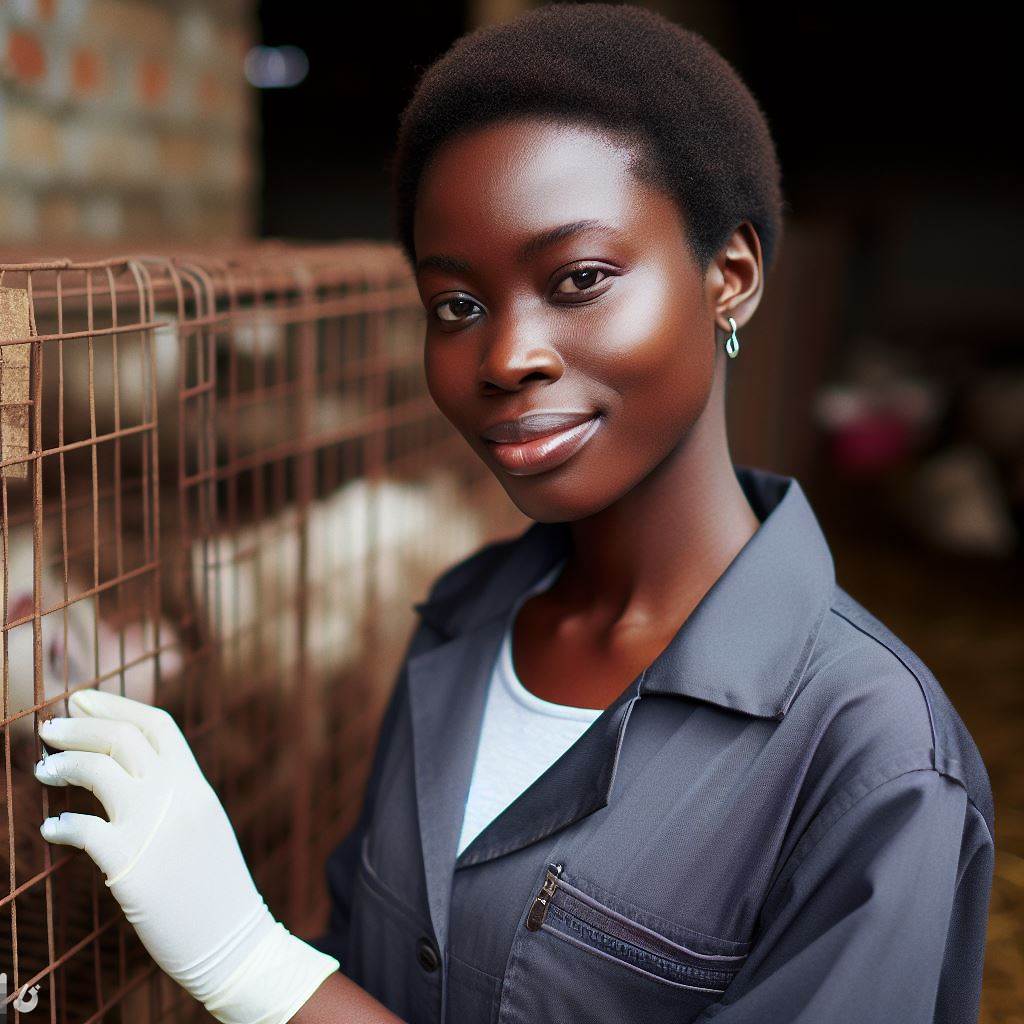Introduction
Master and PhD in Animal Physiology: Animal physiology is the study of how animals function and adapt to their environment.
Studying animal physiology in Nigeria is important for understanding the country’s diverse wildlife and improving agricultural practices.
This blog post explores the master’s and PhD opportunities available in animal physiology in Nigeria.
Overview of Animal Physiology in Nigeria
Brief history and development
Animal physiology is a field that focuses on understanding the biological functions and processes of animals. In Nigeria, the study of animal physiology has evolved significantly over the years.
The development of animal physiology in Nigeria can be traced back to the establishment of various research institutions and the efforts of dedicated researchers.
These institutions have contributed immensely to the advancement of the field.
One of the key milestones in the history of animal physiology in Nigeria was the establishment of the Department of Physiology at the University of Nigeria, Nsukka in 1960.
This marked the beginning of formal education and research in this field.
Key research areas and advancements
Animal physiology in Nigeria encompasses a wide range of research areas and advancements.
Researchers in the country have made significant contributions to various aspects of animal physiology. Some of the key research areas include:
- Metabolism and energy balance: Nigerian researchers have conducted studies to understand the metabolic processes and energy balance in animals. This research has helped in developing strategies for improving animal nutrition and production.
- Reproductive physiology: Understanding the reproductive physiology of animals is crucial for improving breeding programs. Nigerian researchers have focused on studying the reproductive processes and techniques for enhanced breeding in livestock.
- Environmental physiology: Nigeria’s diverse climate and environmental conditions make it an ideal location for studying the physiological adaptations of animals to different environments. Researchers have investigated how animals cope with factors like temperature, humidity, and altitude.
Prominent institutions and researchers in the field
Several institutions and researchers have played a significant role in advancing animal physiology in Nigeria.
These institutions provide excellent opportunities for master’s and PhD studies in animal physiology. Some of the prominent institutions include:
- University of Nigeria, Nsukka: The Department of Physiology at this university is renowned for its research in animal physiology. It offers programs for both undergraduate and postgraduate students.
- Ahmadu Bello University: The Department of Animal Physiology at Ahmadu Bello University is another prestigious institution in Nigeria. It offers research programs and collaborates with international institutions for cutting-edge research.
- Federal University of Agriculture, Abeokuta: This university’s Department of Physiology is actively involved in research related to animal physiology. It provides opportunities for students to pursue advanced studies in the field.
Prominent researchers in animal physiology in Nigeria include Prof. Fidelis Umaru, Prof. Chika Udeh, and Dr. Joy Nwankwo.
These researchers have made significant contributions to the field through their publications, funded projects, and mentoring of students.
In fact, animal physiology in Nigeria has experienced significant growth and development over the years.
The country boasts of prominent institutions and researchers who have contributed to advancements in various research areas.
Aspiring students looking for master’s and PhD opportunities in animal physiology can explore these institutions and work with renowned researchers to further their knowledge and contribute to the field.
Read: Animal Breeding & Genetics: Course Outline in Nigerian Universities
Master’s Opportunities in Animal Physiology in Nigeria
Admission requirements and application process
- Applicants must have a bachelor’s degree in a related field.
- Submission of completed application form, academic transcripts, and letters of recommendation.
- Applicants may need to pass an entrance examination or an interview.
- Application deadline and procedures may vary among universities.
Availability of scholarships and funding options
- Several scholarships and funding opportunities are available for master’s students in animal physiology in Nigeria.
- Students can apply for government scholarships, research grants, or funding from private organizations.
- Some universities also offer tuition waivers or assistantships for qualified students.
List of universities and institutions offering master’s programs in animal physiology
- University of Nigeria, Nsukka
- Ahmadu Bello University
- University of Ibadan
- University of Ilorin
- University of Lagos
Curriculum overview and research areas
The master’s program in animal physiology typically covers the following subjects:
- Principles of animal physiology
- Endocrinology
- Reproductive biology
- Nutrition and metabolism
- Comparative physiology
- Neurobiology
Students also have the opportunity to specialize in specific research areas, such as:
- Cardiovascular physiology
- Respiratory physiology
- Renal physiology
- Environmental physiology
- Exercise physiology
In short, pursuing a master’s degree in animal physiology in Nigeria offers various opportunities for aspiring researchers and professionals in the field.
With a range of universities offering these programs, students can choose the institution that aligns with their academic and research interests.
Additionally, scholarships and funding options make it more accessible for students to pursue their higher education dreams in this field.
Read: Challenges and Triumphs in Nigeria’s Animal Physiology Discipline

PhD Opportunities in Animal Physiology in Nigeria
Eligibility criteria and admission process
- To pursue a PhD in Animal Physiology in Nigeria, candidates must meet certain eligibility criteria.
- These criteria may include having a relevant master’s degree in a related field.
- Applicants must also demonstrate strong research skills and a passion for animal physiology.
- The admission process usually involves submitting an application, including academic transcripts and letters of recommendation.
- Shortlisted candidates may be required to attend an interview or present a research proposal.
Funding opportunities and grants for PhD candidates
- PhD candidates in Animal Physiology in Nigeria can take advantage of various funding opportunities and grants.
- Some universities and research institutions offer scholarships specifically for PhD students in this field.
- These scholarships may cover tuition fees, living expenses, and research costs.
- Additionally, research grants from national and international funding agencies can provide financial support for PhD projects.
- It is advisable for candidates to explore these funding options and apply early to increase their chances of securing financial support.
List of universities and institutions offering PhD programs in animal physiology
- Several universities and research institutions in Nigeria offer PhD programs in Animal Physiology.
- Some of the prominent institutions include the University of Ibadan, Ahmadu Bello University, and the University of Nigeria.
- These programs provide a conducive research environment and access to state-of-the-art facilities.
- Prospective PhD candidates can choose the institution that aligns with their research interests and career goals.
Research focus areas and ongoing projects in animal physiology
- Animal physiology research in Nigeria encompasses various focus areas and ongoing projects.
- Some prevalent research topics include reproductive physiology, endocrine regulation, and cardiovascular physiology.
- Researchers are also studying the effects of environmental stressors on animal health and performance.
- Ongoing projects involve investigating the physiological mechanisms underlying disease resistance in livestock.
- Collaborations between universities, research institutions, and government agencies drive these research efforts.
In essence, pursuing a PhD in Animal Physiology in Nigeria offers exciting opportunities for aspiring researchers.
Eligible candidates can explore the available PhD programs, secure funding through scholarships or grants, and engage in impactful research projects.
The field of animal physiology in Nigeria is evolving, and with the support of universities and research institutions, PhD candidates can contribute to the advancement of knowledge in this important discipline.
Read: Career Opportunities after Studying Animal Genetics in Nigeria
Career Prospects in Animal Physiology in Nigeria
When considering a career in animal physiology in Nigeria, there are various job opportunities available in academia, research institutions, government and non-governmental organizations, as well as potential for entrepreneurial ventures.
The success stories of animal physiologists in Nigeria serve as inspiration for aspiring individuals in this field.
Job opportunities in academia and research institutions
- Lecturer: Animal physiologists can pursue careers as lecturers in universities and colleges, imparting knowledge to students.
- Research Scientist: They can work as research scientists in institutions, conducting studies on animal physiology.
- Lab Technician: Animal physiologists can work as lab technicians, assisting in research projects and experiments.
- Postdoctoral Research Fellow: After completing a PhD, individuals can work as postdoctoral fellows in research institutions, gaining further expertise.
- Research Assistant: Animal physiologists can also work as research assistants, aiding senior researchers in data collection and analysis.
Roles in government and non-governmental organizations
- Wildlife Conservationist: Animal physiologists can work in government and non-governmental organizations, contributing to the conservation and protection of wildlife.
- Zoologist: They can take up roles as zoologists, studying and managing animal populations for government agencies or conservation organizations.
- Animal Welfare Officer: Animal physiologists can work in organizations focused on animal welfare, ensuring ethical treatment and care of animals.
- Policy Advisor: They can provide expertise as policy advisors to government agencies on animal-related issues.
- Research Consultant: Animal physiologists can work as consultants, offering their knowledge and research insights to various organizations.
Potential for entrepreneurial ventures
- Animal Farming: Animal physiologists can venture into animal farming, implementing their knowledge to improve animal health and productivity.
- Consultancy Services: They can establish consultancy services, offering expertise in animal physiology to farmers and organizations.
- Product Development: Animal physiologists can develop and market products related to animal health and nutrition.
- Education and Training: They can start educational programs and training centers to educate individuals on animal physiology.
- Diagnostic Laboratories: Animal physiologists can establish diagnostic laboratories for the analysis and testing of animal samples.
Success stories of animal physiologists in Nigeria
The success stories of animal physiologists in Nigeria serve as motivations for aspiring individuals in the field. These stories highlight their significant contributions and achievements:
- Dr. Adebayo Smith: He pioneered research on the reproductive physiology of indigenous Nigerian cattle breeds, leading to improved breeding practices.
- Prof. Funmi Adeyemi: She developed innovative techniques for the diagnosis and treatment of respiratory diseases in Nigerian poultry, reducing mortality rates.
- Dr. Ibrahim Mohammed: He conducted groundbreaking research on the physiological adaptations of Nigerian wildlife to their habitats, furthering conservation efforts.
- Dr. Grace Okon: She established a successful animal physiology consultancy service, assisting farmers in maximizing productivity and profitability.
- Prof. Ahmed Ibrahim: He played a crucial role in the development of the animal physiology curriculum in Nigerian universities, ensuring quality education for future professionals.
Basically, a career in animal physiology in Nigeria offers a range of job opportunities in academia, research institutions, government and non-governmental organizations.
Aspiring individuals can also explore potential entrepreneurial ventures. The success stories of animal physiologists in Nigeria serve as inspiration for those embarking on this path.
Read: Top 5 Universities in Nigeria Offering Animal Physiology
Challenges and Future Directions
Current challenges faced in the field
- Lack of research funding hinders advancements in animal physiology studies.
- Inadequate infrastructure and equipment pose significant challenges for conducting high-quality research.
- Shortage of skilled personnel in specialized areas of animal physiology limits progress.
- Insufficient awareness and appreciation of animal physiology research within the scientific community.
Strategies to improve animal physiology research in Nigeria
- Increase government funding and support for animal physiology research projects.
- Establish modern research facilities and provide state-of-the-art equipment for conducting experiments.
- Promote and invest in the training and development of animal physiologists.
- Organize conferences, workshops, and seminars to raise awareness and disseminate research findings.
- Encourage collaboration between universities, research institutions, and industry stakeholders.
Collaborations and partnerships for international exposure
- Forge collaborations with renowned international universities and research institutions to enhance knowledge exchange.
- Establish student exchange programs to provide opportunities for Nigerian researchers to study and gain experience abroad.
- Participate in international conferences and scientific networks to foster collaborations and showcase Nigerian research.
Promoting interdisciplinary research in animal physiology
- Encourage collaboration between animal physiologists and experts from other scientific disciplines.
- Integrate computational modeling and bioinformatics tools in animal physiology research.
- Facilitate interdisciplinary research funding schemes to support innovative and cross-cutting projects.
- Promote knowledge sharing and collaboration through interdisciplinary workshops and seminars.
Conclusion
Animal physiology plays a crucial role in understanding and improving the health and productivity of livestock in Nigeria.
By studying the physiological processes of animals, researchers can develop effective strategies for disease prevention, breeding, and nutrition.
If you’re passionate about animal physiology, pursuing a master’s or PhD program can open doors to exciting research opportunities.
Through advanced studies, you can contribute to the development of innovative solutions for the challenges faced by the animal agriculture industry in Nigeria.
With the increasing recognition of the importance of animal physiology in Nigeria, there is hope for future advancements and growth in this field.
By attracting more researchers and providing adequate funding, Nigeria can become a hub for cutting-edge research in animal physiology, leading to improved livestock health and agricultural practices.
Transform Your Career with Expert Guidance
Get personalized mentorship consulting that’s tailored to your unique path. Our expert advice is actionable and exclusive.
Get StartedIn the end, animal physiology is vital for the development and progress of the animal agriculture industry in Nigeria.
Aspiring researchers should consider pursuing master’s and PhD opportunities to contribute to the advancements in this field.
With continued investment and support, there is great potential for Nigeria to lead in animal physiology research, ultimately benefiting the entire livestock sector and the nation’s economy.




